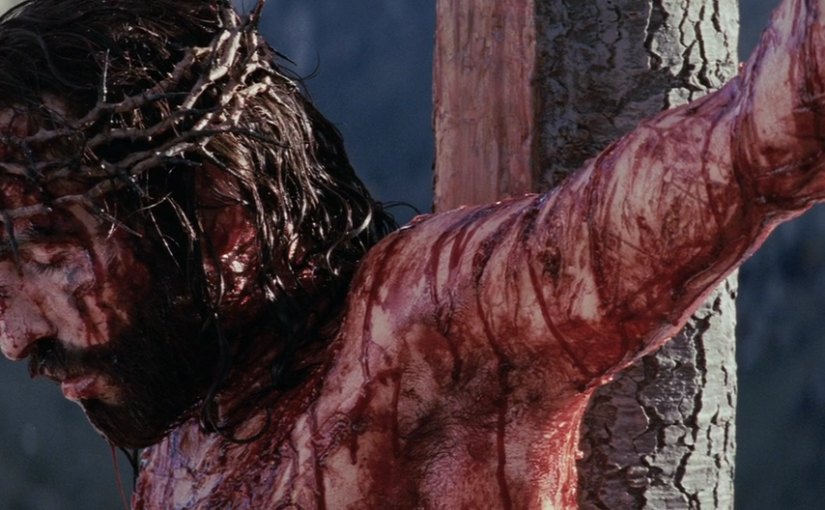This is it. Today’s liturgy brings us to the place we’ve been journeying toward all during Lent. These past forty days have seen Jesus tangle with the established religion, all the while healing the sick and preaching repentance. We have participated in that by receiving absolution in Confession, participating in our parish mission, taking part in our Project Passion Prayer experience, and by our fasting and works of charity. And so it seems quite fitting that our Mass today begins on a high note: with Jesus entering triumphantly into the city of Jerusalem. But just three chapters later in Mark’s Gospel, all of his good work becomes his undoing as he is arrested, tried and put to death. It doesn’t seem right or just, does it?
We know that’s how life is. We offer our works of charity and fasting and prayer and we hope for a better life, but sometimes that’s not how it works out. Sometimes we too end up denounced, the victims of gossip and calumny, or we spend ourselves doing good for others, all the while walking a difficult road in our own lives with illness, family issues, job troubles or financial worries. And so we have to take up that rough, heavy cross and travel to our own personal Golgothas. Perhaps, then, today we find ourselves in all-too-familiar territory, and find it difficult to hear.
The trouble is that the Cross is an in-your-face reminder that pain is part and parcel of our life of salvation. Jesus did not come to take away our pain, he came to redeem it. Not only that, he came to take it on himself. Far from being embarrassed by our sin and pain, Jesus took it to the cross, redeeming our brokenness, and leaving us an everlasting promise that there is no pain too great for our God to bear and there is no way we can ever fall so far that our God can’t reach us. Jesus took our every hurt, our every pain, our every sin, our every shame, our every resentment, our every emptiness, and left them all there at the foot of the Cross. So if we find the Cross and Golgotha a difficult place to be, maybe it’s no wonder.
I know there are many among us now who are carrying pain with them each day. I hear it all the time, whether it’s the patient in the hospital who’s been away from the Church and estranged from their family and is facing death, or the young parent who wants to live a spiritual life but the demands of family and perhaps a job are all that he or she can accomplish in a day. For some it’s very serious stuff: the diagnosis of an illness that is frightening, the loss of a loved one, the ending of a job or career, or even a marriage. Broken relationships, upheaval in our lives, uncertainty in our future are crosses that are so very familiar to so many of us.
But as horrible as those things are to deal with, and as dejected and frustrated and fearful as they may make us feel, the one thing we should never entertain is a feeling of loneliness. Because for all of us who are hurting in any way, all we have to do is look at the Cross and realize that there is nothing our God won’t do for us. No, it’s not pretty, and God may not take away our pain right away, but he will never ever leave us alone in it. In fact, he helps us bear it, and ultimately, he will raise us up out of it. As we enter this Holy Week, we are reminded gently that the cross, while significant, is not the end of the story. Yes, we have to suffer our own Good Fridays; but we confidently remember that we also get an Easter Sunday. And that is what gives us all the confidence to take up our cross and journey on.
These are not ordinary days – they are absolutely not for business as usual. I beg you all to enter into these Holy Days with passion, with prayerfulness and in faith. Gather with us on Holy Thursday at 7:00pm to celebrate the giving of the Eucharist and the Priesthood, and the call to service that comes from our baptism. On Good Friday at 3:00 in the afternoon, we will have the opportunity once again to reflect on the Passion, to venerate the cross that won our salvation, and to receive the Eucharist, which is our strength. Finally, at 8:00 on Holy Saturday night, we will gather outside to keep vigil for the resurrection we have been promised. We will hear stories of our salvation, we will celebrate our baptism and welcome five people into our family, rejoicing in the victory of Christ over sin and death. No Catholic should ever miss the celebrations of these Holy Days, for these days truly sustain our daily living, give us the grace to take up our little crosses day by day, and gift us with strength to continue the journey.


You must be logged in to post a comment.